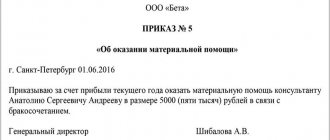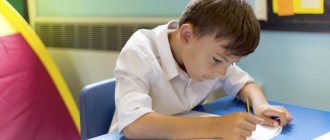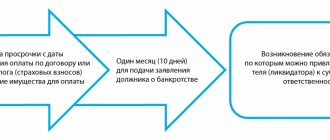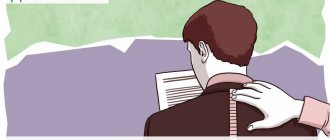Characteristics of the student’s family
Nadezhda has been studying at this school since September 1, 2021.
Before that, she studied at the Mokrousovskaya Basic Secondary School. In connection with the move to the city of Topki, she was admitted to MAOU “Secondary School No. 1” in grade 3 “b”. In the 4th grade, she was left for a repeat year of study, having two bad marks for the year in the subjects: mathematics and Russian language. The family is incomplete.
The girl’s mother, Tatyana Nikolaevna Ivanova, is raising the girl. The father does not live with his family. Before moving to Topki, Nadezhda and her mother lived in the village of Mokrousovo. There is no permanent place of residence in Topki. Currently they have rented accommodation.
Primary (formal) data about the family
The characteristics of a family should begin with basic, primary data about its members:
- Full name, year of birth, education, place of work and position, contact numbers of mother, father or people who replace them.
- Information about other family members (full name, relationship to the student, field of activity, contact information): grandparents, brothers, sisters and others.
- Information about other people who are not family members, but live in the same house for a long time (full name, field of activity, who the other family members are, contact information).
- Address where family members live.
Positive characteristics for a family: sample
There are situations in life associated with both professional and social nuances when an institution or individual requires a family reference. This is an official document form provided from an educational institution, workplace or social organization, which describes an individual citizen or an entire family.
- Observe the family, conduct personal conversations with each of its members, make visits and record the results of the work done.
- Availability of family law.
- Reviews about each of the parents from teachers (they should tell in detail about the life of each of the pupils) about the attitude of the family towards the child (children) and whether the parents cope with their responsibilities.
- Other opinions.
On the topic: methodological developments, presentations and notes
The material provides a sample description of a student who is registered with the social and pedagogical service of the school. A feature of this characteristic is the tracking of positive changes in the same child during his studies in primary school.
An example of a psychological and pedagogical characteristic for a preschool education student
The material will be useful for primary school teachers. These characteristics of students represent an assessment of their personal and business qualities, abilities and skills in educational and extracurricular activities. Alternative models of living for orphans to the orphanage - substitute families (adoption, guardianship and foster family) - are extremely difficult to develop in modern Russia.
Regulatory documents regulating the activities of preschool educational organizations 1. Order of the Ministry of Health and Social Development of the Russian Federation dated August 26, 2021 No. 761n “On approval of the Unified Qualification.
Characteristics of the student’s family
The boy, born in 2021, is being raised in a full, low-income family. (The parents are not married, but live together, the children bear the mother’s surname). Mom, Zanina Olga Nikolaevna, does not have a permanent job. Temporarily works in the fields, in a bakery. Father, Sergei Igorevich Kan, receives a pension for caring for a disabled child. The boy lives in a three-room apartment, where the child is given a separate room, together with his mother, father and two brothers (5 people in total).
The family can be classified as a family with unstable, low material income. This is due to the seasonality of parents' work. But, nevertheless, the child is provided with the necessary clothing, textbooks, and has money for lunch in the canteen. The psychological situation in the family is stable. Parents spend enough time with the child, the mother supervises homework. Sasha improved his performance in some subjects, namely algebra, geography, and history. Mom, Olga Nikolaevna, regularly attends parent-teacher meetings and monitors the child’s interest in learning. Close contact has been established with the class teacher, subject teachers, social pedagogue and school psychologist. Olga Nikolaevna reacts adequately to teachers’ comments and recommendations. Preventive conversations are regularly held with parents. The family is visited by a class teacher, a social teacher, and a psychologist. The family is provided with psychological assistance. While working with the family, positive changes occurred.
Development program passport for 2021 2021
The staffing of the kindergarten meets modern requirements. The activities of the kindergarten are carried out by: head, senior teacher, teachers, physical education teacher, swimming instructor, speech therapist, educational psychologist, music director, additional education teacher in Lego pedagogy, additional education teacher in English, additional education teacher choreography, head nurse, massage nurse.
Head: Nadezhda Borisovna Rudakova has a higher pedagogical education, Moscow City Pedagogical Institute. 15 years of teaching experience. Awarded a Certificate of Honor from the Ministry of Education and Science. Has the highest category.
Family characteristics: recommendations for compilation, structure, how to collect information
Before a family profile is drawn up, you need to go through a number of preparatory stages, as a result of which information for the document will be collected: Conduct a conversation with the student, observe his behavior, use psychological techniques aimed at studying the child’s perception of his family, assessing the psychological climate within families. Visit the place of residence of the child and his family, draw up a report on the inspection of living conditions. Talk to the parents about the relationship with the child. The degree of parental participation in a student’s school life can be assessed by their participation in parent-teacher meetings, checking his diary, and visiting an educational institution on his own initiative. To get a more objective picture, it is better not to study the family’s place of residence alone. You can involve a representative of the parent committee, a social teacher or a psychologist (especially in the case of dysfunctional families).
The family constantly monitors the girl’s progress at school and her homework. Adults show interest in the child’s successes and failures and respond adequately to teachers’ recommendations and advice.
Characteristics from place of residence
Characteristics from the place of residence are compiled quite rarely and are usually attached as an additional document to the document from work. It helps to get an idea of the personal qualities of a citizen, the climate within the family, and his relationships with society (neighbors).
Such a document can be drawn up by the MKD Council, HOA, district police officer or neighbors. It is certified by the persons who compose it, numbering at least three people (neighbors). You can see a sample
here
.
Ready, positive testimonial for mom from the class teacher
On this basis, conflicts often occur in the family; cases of physical violence by the father towards his son have been recorded. There is no interest in the child’s life even during periods of sobriety of the father. Most often, he spends time with friends, watching TV, or does not appear at home for a long time. Does not respond to teachers’ recommendations, behaves tactlessly and rudely. The grandmother takes care of the child's household needs.
She also performs educational functions and monitors the boy’s progress. Thus, the family is classified as marginal. The child does not receive full financial support and grows up in a psychologically unstable, conflict-ridden family with a tendency to violence.
Structure
The family is characterized as complete, with a male role principle. A small family, homogeneous, with a pronounced patriarchal tendency, has a rather hidden structure.
The functions are clearly distributed: financial support and leisure planning are performed by the father, economic, household and, to a greater extent, educational - by the mother. The emotional-therapeutic function is performed competently and stably, the child sees authority in the person of the parents, and his problems are solved together. The security function is satisfactory, there is no lack of love on the part of both parents. My mother is a housewife and is always at home. My father works locally and is often at home. They spend their leisure time together.
The family does not have financial difficulties; the average income per family member is quite high. The apartment has the necessary household appliances and appliances that make everyday life easier.
There are unchanging traditions in the family (holidays are celebrated together, vacation trips as well). They rarely see their relatives, but they keep in touch.
A positive reference for a parent from the class teacher is ready
Characteristics of a parent are the most important document that represents the socio-psychological traits of a mother or father in terms of their impact on raising a child. The performance of parenting functions, the psychological atmosphere in the family - all this affects the development of the younger generation.
Education November 17, 2021 Characteristics of a parent are the most important document that represents the socio-psychological traits of a mother or father in terms of their impact on raising a child. The performance of parenting functions, the psychological atmosphere in the family - all this affects the development of the younger generation. That is why an adequate presentation of these characteristics helps to understand the extent to which the child’s needs are met and whether the parents cope with the responsibilities assigned to them in general. The characteristics of the child’s parent are drawn up in a fairly free form, but there are some data that must be presented.
Psychological compatibility
No visible disagreements were found in the interpretation of basic values. Role expectations in the family are quite justified. All family members have standard behavioral stereotypes; there are no deviations.
Most likely, the climate is favorable; no tendency towards increased conflict and nervousness has been noticed. All family members are satisfied with their social status. The leading position is occupied by the father as the breadwinner and organizer. When solving pressing issues or problems, the family gathers as a whole for a family council.
No disturbances or deviations in physical and mental development were noticed. The mother is involved in raising the child, since the father spends less time at home (due to work). There is no pronounced influence from the mother. There are no excessive demands placed on the child, and there is no particular disagreement in this area. The style of upbringing in the family is democratic. The child is independent in making many decisions, but everything is within reason. He spends his personal time with friends or with his family; his opinion is not suppressed by any of his parents. Education at school is not very strictly controlled. The manifestation of congruence and empathy towards the child is high, no nagging or criticism towards him was noticed.
The teenager does not experience difficulties in learning or communicating with peers. There are no antisocial personalities in his circle of friends. The child is sociable and knows his way around people in everyday life. The role model is the father.
Characteristics for a 4th grade student from the class teacher ready
At first glance, the girl is well dressed and well-groomed. During her studies, _____ showed herself to be an open, sociable child. She easily comes into contact with peers and teachers. He is not afraid of wrong answers, he says what he thinks. Treats adults with respect and listens. Follows all instructions from the teacher. He really likes to be on duty in the classroom until everything is done and leaves; sometimes he does work for others. Tries to keep his things and school property in order. The reaction to the teacher’s comments is positive, he tries to correct mistakes, and feels guilty (lowers his head, remains silent).
________________ tries to arrange his personal life, which affects the child. During the period of living with her partner (in winter) separately from her family (only Yana lived with her), her daughter was poorly monitored: homework in subjects was not completed, she was periodically unprepared for lessons, sometimes missed lessons without explanation (or, for example, she said “the down jacket didn’t have time to dry”), money for food was not given during this period. The mother herself very rarely approaches the teacher.
The child's position in the family
The teenager trusts both parents equally, and there are practically no conflicts between them (except for minor everyday ones). The mother shows great emotional attachment to the child, so there are no secrets or scandals between them. The father also does not conflict with any of the family members, having an easy-going character. The son has an equal position with his parents, making decisions together with them regarding problems that arise in everyday life or in communication.
There is a special offer on our website - you can quickly get advice from a professional lawyer completely free of charge by simply filling out the form below.
Classroom management: family characteristics (primary school)
Adults create conditions for the proper development of children, show interest in the affairs and studies of their eldest daughter and granddaughter ________. Both parents are interested in the child’s studies and are active helpers. Mom attends all parent-teacher meetings.
There comes a certain moment for any class teacher when it is necessary to write a description of a student’s family. Everyone has encountered this problem. I offer you a sample description that covers all the main points. I hope it will be useful for both beginning teachers and experienced teachers.
Student family survey card
The description of the family may be shorter and more simplified. Its sample is a form that includes the following main points:
- Information about parents and other people living with the family.
- Address and general characteristics of the premises.
- Social status of the family.
- Material security of its members.
- What kind of help is needed (material, psychological, medical).
- What types of work were carried out with the family.
The survey card is also a characteristic of the family. The sample differs only in the lack of data on the moral and psychological image of the family and conclusions about the socio-psychological comfort of the student.
Family characteristics
- Type of upbringing (authoritarian, democratic, liberal) and its subtypes: overprotection, connivance, rejection, demandingness, love and others.
- Description of the psychological climate in the family: stability, tension, stability of the situation, prevailing emotions and states (joy, aggression, apathy, indifference, fear, calm, etc.).
- The degree of interest of parents in the child’s relationships with peers, his achievements, success in educational activities.
- Availability of joint activities with the child, how leisure time is spent in the family, how parents react to the successes and failures of their son or daughter.
Parents can monitor educational activities constantly, periodically, or not be interested in this issue at all. They may be motivating or indifferent to the child's desire to learn and develop their interests. The frequency of attendance at meetings and the nature of the reaction to recommendations and comments from teachers (adequate and inadequate) are also different.
Peculiarities of interaction between a preschool educational institution and a pupil’s family article on the topic
One of the forms of interaction is to connect parents to the life of the preschool educational institution, organizing their joint activities with their children. So, parents of different professions (seamstress, driver, doctor, librarian, artist, etc.) come to visit preschoolers. Parents take part in various activities with their children, film events, provide transportation, etc. In addition, parents can be involved in cleanup days, participate in landscaping the preschool territory, take preschoolers to performances, excursions on weekends, and visit museums together.
The participation of parents in the work of pedagogical councils is also very effective - it helps to identify common problems and outline ways to solve them. The participation of parents in the “Portrait of a Modern Teacher” workshops is also mutually beneficial, where participants exchange opinions on what a teacher should be like to meet the requirements of high morality and the needs of modern society.
Characteristics of a supervised child from the class teacher sample
He is being brought up in the family of his grandmother Natalya Nikolaevna Vasilyeva, the guardians take good care of Danil’s studies and appearance, regularly call the class teacher to find out his progress or warn about illness, worry about the child, take an active part in the life of the class and the renovation of the classroom.
Can be used for middle and high school students. In contrast to the usual characteristics, special attention is paid to the relationship between the guardian and the child, the responsible attitude of the guardian to the maintenance, upbringing and training of the ward.
For preschoolers
Citizens who have not previously worked, as well as applicants who want to go back to work after more than a year's break from work, can count on the minimum amount of benefits. In addition, a benefit of 850 rubles is given to those dismissed for violation of labor discipline, dismissed for any reason within 12 months before the start of unemployment and who had paid work for less than 26 weeks. "Size.
Sample and example characteristics for a family, parents of a difficult teenager, student
The psychological situation in the family is stable/not stable, tense/not tense, stable/not stable. Parents/mother/father spend enough/a lot/not enough time with the child, control homework/do *activities* together/do not raise the child/make mistakes in upbringing, as a result of which the child is pedagogically neglected, which is expressed in conflict. /aggression/irritability/negativism in assessing reality, etc.
The material and economic situation is satisfactory. The style of parent-child relationships is democratic. The family is interested in issues of education. They show interest in the consultations and recommendations of educators in the corner for parents, and also regularly attend parent-teacher meetings. Parenting is mainly done by the mother.
The document in question is the basis for the preparation of subsequent papers of a descriptive nature. The peculiarity of the document is that it serves as the main evidence that parents do not take part in the upbringing and development of the child. The form may be required in the following cases:
Characteristics of a child sent to the guardianship authorities from kindergarten
- achieve respect and understanding in the relationship between children and parents;
- if necessary, provide psychological support to the family;
- to instill in parents a pedagogical culture, to show the ways of proper child care.
- attracting fathers and mothers to actively participate in the life of the class;
- assistance to parents in matters of proper child upbringing;
- The number of rooms, the presence of a separate room for the child, the presence of a separate place for rest.
- Compliance with sanitary and hygienic standards of housing: regular cleaning, cluttering of the premises, etc.
- Availability of necessary furniture, space for the child’s educational or play activities, equipment and educational supplies or toys.
- Conclusion about how much the place of residence influences the success of a child’s development.
Pedagogical characteristics for a preschool child at PMPK (sample) Description: This material will be useful for teachers of preschool institutions. Pedagogical characteristics for a preschool child.
Family characteristics
General conclusions are drawn based on the data obtained: how prosperous or dysfunctional the family is in material, social and psycho-emotional terms, what aspects and how they influence the development of the child, what parents or other educators will be advised to pay attention to.
A specialist who works with children must regularly perform several actions: Social and everyday skills are age appropriate. The child can independently use toiletries, wash his face, wash his hands, comb his hair, can dress, undress, put on his shoes, and use a spoon independently.
Relationships with peers and adults are friendly, enters into communication easily and quickly. Constantly animated, very active in all areas of preschool life, intervenes in everything, takes on all matters, emotional outbursts are very rare. The child knows how to be restrained and can hide fear, aggression and tears.
Characteristics of a preschooler from a dysfunctional family, ready-made sample
It is necessary to list the illnesses due to which the child missed visits to kindergarten. Next, the child’s relationships with peers and the teacher are described, how sociable he is and his temperament, his level of independence, observance of personal hygiene rules, the child’s attitude towards activities (what activities arouse his interest, and which ones cause difficulties). The characteristics describe the child’s attitude towards work: does he complete what he starts, activities that arouse special interest in the child, does the child need motivation to start a certain type of work activity. The child’s positioning in the game should be described, and what roles he likes to try on, how he gets out of critical situations.
Can copy printed and handwritten text in the Russian language with a small number of errors. When writing from dictation, he makes persistent specific errors: he does not put a period at the end of a sentence, confuses and skips letters, often adds or does not complete elements of letters, writes prepositions together, and makes a large number of spelling errors.
You might be interested ==> Peer-reviewed scientific publications 2021
The parent pays attention in terms of education (cooperates with the teacher, attends school, makes phone calls). Monitors the completion of homework. When any problems arise, he reacts and tries to find solutions. She is buying school supplies. Monitors the girl's appearance.
Ready-made character reference for mother from the class teacher
Vladimir Alekseevich is an example for his children in everything. He is neat, fit, hardworking, friendly, leads a healthy lifestyle and introduces his children to this: he taught both sons to skate and swim. The eldest son Artem is a participant in swimming and athletics competitions. Vladimir Alekseevich was fond of hockey in his youth, and even now plays in amateur competitions; did weightlifting. How does he teach his son Nikita to be orderly? Not every housewife has such order as Nikita’s locker in kindergarten! All things are in their places. If dad makes something, his son Nikita helps nearby.
To begin the process, a whole set of documents is required. What documents are needed to deprive the parental rights of the father and mother? The set of documents required to be submitted to the court when applying for deprivation of parental rights contains the data of all interested parties, and papers characterizing the situation and proving the existence of legal grounds for initiating a case: Statement of Claim.
In communicating with his son, Vladimir Alekseevich is attentive, tactful, will always listen to his son and answer his questions; - acts as an equal interlocutor. The son shares his successes and failures with his father . It is clear that the child trusts his father in everything, there is complete understanding between them. Nikita's dad is friendly and friendly with other children.
Characteristics of a parent (father) for the “Fatherhood” competition
3. Health: more rarely, often, suffers from colds, has chronic health problems, eats poorly, sleeps difficultly and restlessly. 4. Characteristics of activities: self-care skills: can he independently use toiletries, wash his face, wash his hands, comb his hair, can he dress, undress, put on his shoes independently, can he be shy, tie and untie his shoelaces, use a spoon, fork, can he put his things away and bed.
The eldest son, Artem, continues his father’s work, and chose the profession of investigator. The guy has a positive influence on his younger brother, who wants to be like him in everything. Vladimir Alekseevich is an example for his children in everything.
- assistance to parents in matters of proper child upbringing;
- if necessary, provide psychological support to the family;
- achieve respect and understanding in the relationship between children and parents;
- attracting fathers and mothers to actively participate in the life of the class;
- to instill in parents a pedagogical culture, to show the ways of proper child care.
When is a characteristic needed?
- If the deprivation of parental rights did not occur, but the parent received a warning from an organization for the protection of minors due to any negative actions. In this case, a positive reference for the mother or father to the guardianship authorities, written by a teacher or educator, can become one of the proofs of the person’s correction.
- If a person has served a prison sentence, he will be under the supervision of the guardianship authorities for some time, who need to make sure that the child’s rights are not violated.
- If a person who was previously deprived of parental rights wants to restore them. In this case, temporary guardianship is taken over the child, and in addition to the teacher, a reference is drawn up by the child’s current guardian, who must assess whether his ward will be well with the parent.
Since the information is requested by official authorities upon request, he is obliged to prepare the document. But in the absence of a properly completed request (form of the organization, signature of the head of the body), the class teacher has the right to refuse.
According to the state, the main reason for social orphanhood is the lack of assistance to families with children. The parent does not have sufficient resources to overcome the crisis (finding housing, work, treatment for alcohol addiction or other diseases).
In KDN
Educational organizations (schools, kindergartens) are part of the system for preventing neglect and homelessness of children. If signs of family trouble appear, teachers must alert the child welfare department or the district control department.
May 25, 2021 semeiadvo 800
Share this post
- Related Posts
- Travel for St. Petersburg pensioners on Leningradskaya buses
- Assistance in building a house for a large family in the Sverdlovsk region
- What do they give for 3 children in 2021 in Belgorod
- The TV can be taken away by the bailiffs
Ready-made character reference for mother from the class teacher
In order to perform their functions pedagogically competent, successfully and effectively, the class teacher must have a good knowledge of the psychological and pedagogical foundations of working with children of a particular age, be informed about the latest trends, methods and forms of educational activities, and master modern educational technologies. In his activities, the class teacher must take into account the level of education of students, the social and material conditions of their lives. The activities of the class teacher are a purposeful, systematic, planned process, built on the basis of the Charter of a general education institution, other local acts, analysis of previous activities, positive and negative trends in social life, based on a person-oriented approach to students, taking into account the current tasks facing the teaching staff of the general education institutions, and situations in the class team, interethnic and interfaith relations. In any lesson, Bogdan is an active assistant to the teacher. He is distinguished by high intelligence and an active life position.
The family constantly monitors the girl’s progress at school and her homework. Adults show interest in the child’s successes and failures and respond adequately to teachers’ recommendations and advice. Material number: DB Use the search in our database of materials. Login Registration. Forgot your password? Login using:. Find out how the educational check ended?
Characteristics required by the guardianship and trusteeship authorities
- presence of a criminal record, fact of criminal prosecution for crimes against the person;
- deprivation of parents' rights by court decision;
- being registered for diseases such as alcoholism and drug addiction;
- existence of facts of cancellation of adoption earlier due to the fault of the adoptive parent;
- the state of same-sex marriages that are registered in a number of foreign countries;
- absence of a document confirming that the foster parents have attended school.
- Personal data of the citizen (last name, first name, patronymic)
- Information about education, advanced training and retraining courses
- The period of employment in this organization (work experience).
- Position held and list of job duties performed.
- Professional skills and labor achievements of a citizen. Availability of incentives and penalties.
- Personal qualities: organizational skills, discipline, responsibility, communication skills, bad habits, team relationships, ability to negotiate and relationships with colleagues.
Characteristics of a 2nd grade student from a disadvantaged family
In September, the school received a call from a social security worker about the neglectful attitude of R.S. Ivanova’s mother towards the children, after mother-in-law Raisa Alexandrovna contacted this authority. After this, a personal meeting with the mother, Ivanova R.S., took place between the class teacher and the social teacher, at which she explained that this situation occurred because there were family disagreements between her and her mother-in-law. During this period, the girl was afraid of any visits from her grandmother to school (she brought treats and money to the children), because she did not want her mother to find out.
During her studies, Irina showed herself to be an active, open, sociable child. She easily gets in touch with her peers, teachers, and is well-mannered. Treats adults with respect and listens. Follows all instructions from the teacher. The girl is neat, her school supplies and clothes are in good condition, but her work in notebooks can be careless due to inattention. The reaction to the teacher’s comments is positive, he tries to correct mistakes, and feels guilty. Irina has her own opinion, can stand up for her classmates, and is not influenced by others. He is friends with everyone in the class, but shows more interest in boys.
It is better for children to live with one loving parent than in a full-fledged family, but with an abuser.”
After all, at first, before getting married, a couple simply builds their relationship, this period is called the “candy-bouquet” period, but it can be different, sometimes even at the beginning people understand that they are not suitable for each other, that their feelings were wrong and they are too different in order to live this long life together hand in hand, because family is a serious step that not everyone decides to take, even after a very long time in a relationship.
The system of interpersonal relations in the family, built on the recognition of the possibility and even expediency of independent existence of adults from children, can be generated by the tactics of “non-interference.” At the same time, A.V. Petrovsky assumes that two worlds can coexist: adults and children, and neither one nor the other should cross the line thus outlined. Most often, this type of relationship is based on the passivity of parents as educators.
CHARACTERISTICS for a 3rd grade student
The boy has health group 2, physical education group is the main one. Andrey underwent surgery on his stomach and was treated in Ufa for a long time. He doesn’t take care of his appearance and is sloppy. School supplies are in disgraceful condition. Violates the rules for students.
By nature he is choleric, unbalanced, but very sociable. He often conflicts with classmates, offends girls, and fights with boys. He is rude to adults and often gets into arguments. He has friends in class and runs errands. Attends school-wide events and tries to participate everywhere. Doesn't attend clubs or sections.
Explanatory note 2
II . Content section of the Program
The content of the Program is determined in accordance with the directions of child development, corresponds to the basic provisions of developmental psychology and preschool pedagogy and ensures the unity of educational, developmental and training goals and objectives.
- in infancy (2 months - 1 year) - direct emotional communication with an adult, manipulation with objects and cognitive-exploratory actions, perception of music, children's songs and poems, motor activity and tactile-motor games;









